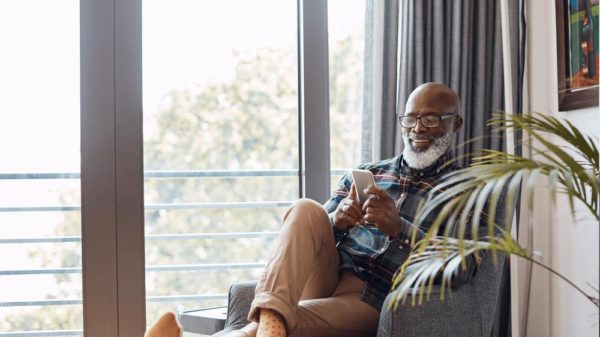If you have ever wondered who needs hearing rehabilitation, you’re not alone. You might be surprised at the ways hearing rehab may be able to kick your confidence up a notch and even make a difference down the road. Your clinic may have an adult rehabilitation program and you can also find great resources on our website.
Who needs hearing rehabilitation? Also called aural rehabilitation or auditory rehabilitation, it’s not just about checking your speech test scores at the clinic. All the tools and resources that help to improve your confidence and satisfaction with your hearing fall under the umbrella of rehabilitation.
If you want to feel more confident using your sound processor to the best of your advantage, hearing in a challenging environment or talking on the phone, we have suggestions for you! Did you know that we have a Rehabilitation Resources section on our website? Have a look around and try some things out! If you’re curious whether rehab might be for you, read about these different approaches.
1. Hearing rehabilitation in your first year with a cochlear implant
Did you recently have your initial cochlear implant activation? While each individual has their own hearing journey, you may be a little overwhelmed in the first days and weeks as you transition to hearing with your cochlear implant. Your brain is learning to understand sounds in a new way, which is possible thanks to the ability of our brains to adapt and change123.
By wearing your sound processor all day and dedicating some time to practice using all your tools and resources, it is possible that you could actually make that transition a little easier and reach your goals a little faster4.
Explore our website to find ideas like practicing streaming to your compatible5 smart phone, listening with your Cochlear™ Mini Microphone 2+, using the Cochlear™ CoPilot app or the Hearing Therapy Manual in your activation kit. Your brain is creating new neural pathways, it makes sense to provide a little support.
2. Hearing rehabilitation after upgrading to a new sound processor or getting a second implant
Have you gotten something new? This may be a great time to enjoy a little focused attention in the form of hearing rehab! Practicing listening exercises, also called auditory training, can be important to unlocking your potential.6789
When upgrading to a new sound processor, some people like to do listening exercises to get accustomed to the new features. It’s helpful to “test drive” the new technology before you dive right into a challenging work environment or social event. A little practice can help your confidence with your new technology.
If you recently had surgery for a second cochlear implant, hearing rehabilitation is recommended to help exercise that new ear. It is a good idea to spend some time on a regular basis actively engaging in exercises with that new ear by itself to help that neural pathway thrive.
3. Hearing rehabilitation can help you monitor your success over the long term
Did you know that how you hear with your cochlear implant can change over time? In the first few months after your initial activation, you will notice improvements in your hearing but it stabilizes pretty quickly. If you are doing some hearing rehab on your own at home, you will know how well you should be hearing with your sound processor and this can serve as your baseline.
Sometimes you may experience subtle changes in your hearing over time. If you or your loved ones notice that you may not be hearing as well as you usually do, you can go back and try your favorite listening exercises to see if there has been a change. It may be as simple as changing your microphone cover!
If you have done some troubleshooting and the processor is all in good working order, you should contact your clinic and see if they want you to come in for a programming appointment. If you can tell your clinician some specific things that seem different – has something become too soft or too loud? Is there an environment or rehab exercise that you can list as an example? – this can greatly help to determine the next step.
Remember to explore the Rehabilitation Resources section on our on cochlear.com to find out more.
- Fu Q, Galvin J. Perceptual learning and auditory training in cochlear implant recipients. Trends Amplif. 2007; 11:193–205. [PubMed: 17709574]
- Boothroyd A. (2010) Adapting to changed hearing: the potential role of formal training. J Am Acad Audiol. 2010; 21:601–611. [PubMed: 21241648]
- Keidser, Gitte; Naylor, Graham; Brungart, Douglas S.; Caduff, Andreas; Campos, Jennifer; Carlile, Simon; Carpenter, Mark G.; Grimm, Giso; Hohmann, Volker; Holube, Inga; Launer, Stefan; Lunner, Thomas; Mehra, Ravish; Rapport, Frances; Slaney, Malcolm; Smeds, Karolina The Quest for Ecological Validity in Hearing Science: What It Is, Why It Matters, and How to Advance It, Ear and Hearing: November/December 2020 – Volume 41 – Issue – p 5S-19S
- Anderson, S., & Kraus, N. (2013). Auditory training: Evidence for neural plasticity in older adults. SIG 6 Perspectives on Hearing and Hearing Disorders: Research and Diagnostics, 17, 37-57. https://doi.org/doi:10.1044/hhd17.1.37
- To confirm smartphone compatibility go to https://www.cochlear.com/compatibility
- Fu Q, Galvin J. Perceptual learning and auditory training in cochlear implant recipients. Trends Amplif. 2007; 11:193–205. [PubMed: 17709574]
- Boothroyd A. (2010) Adapting to changed hearing: the potential role of formal training. J Am Acad Audiol. 2010; 21:601–611. [PubMed: 21241648]
- Anderson, S., & Kraus, N. (2013). Auditory training: Evidence for neural plasticity in older adults. SIG 6 Perspectives on Hearing and Hearing Disorders: Research and Diagnostics, 17, 37-57. https://doi.org/doi:10.1044/hhd17.1.37
- Drouin, J. R., & Theodore, R. M. (2020). Leveraging interdisciplinary perspectives to optimize auditory training for cochlear implant users. Language and Linguistics Compass.doi:10.1111/lnc3.12394
